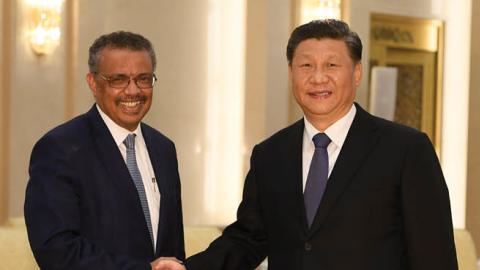Public health officials urgently need access to reliable data in order to respond effectively to the coronavirus crisis. But in China and around the world, authoritarian regimes are making this impossible by spreading disinformation to divert attention from their failings.
The Trump administration can counter this dangerous trend by imposing sanctions on foreign officials who deliberately spread disinformation about global public health issues, starting with Chinese Communist Party officials who covered up the initial outbreak of coronavirus in Wuhan. This would be a first step toward holding the communist government accountable and, more importantly, deter officials in other authoritarian regimes from similarly reckless conduct. Authority to do so has been proposed in the recently introduced Li Wenliang Global Public Health Accountability Act, named after a whistleblower Chinese doctor who died from the virus.
As the global superpower, the United States is uniquely positioned to exercise political leverage through economic statecraft. Some suggest that this has led to an overreliance on sanctions as the primary nonviolent response to security threats, citing continued adversarial conduct by regimes in Iran, North Korea, Russia, Venezuela, and elsewhere as evidence of ineffectiveness.
Yet, not all sanctions programs aspire to change the behavior of entire governments. The Global Magnitsky Act, for instance, enables the U.S. to designate specific individuals for their role in corruption or human rights violations. They are then unable to travel to the U.S. or make financial transactions using the U.S. dollar, which can have serious repercussions for contemporary globe-trotting kleptocrats. Global Magnitsky sanctions also play an important role in documenting abuses, demonstrating solidarity with victims, and deterring further corrupt and abusive behavior. These are all good reasons to deploy America’s financial firepower, and so should be targeting actions that threaten public health during a global pandemic.
The Chinese Communist Party has mounted an aggressive media campaign to conceal how its paranoid institutional failings fueled the coronavirus outbreak, positioning itself instead as the benevolent savior of populations now suffering the consequences. Astonishingly, many Western media outlets continue to republish unreliable statistics about the virus’s spread and decline within China, often while comparing their own governments’ response unfavorably.
But the confirmed timeline of Communist Party behavior in those critical first few weeks tells a different story. According to a recent study, the number of cases could have been reduced by 95% had Wuhan officials acted just three weeks earlier. Instead, they spent that time destroying lab samples and threatening whistleblowers such as Li Wenliang.
The Chinese Communist Party officials concerned may not travel to the U.S. or hold significant assets in U.S. dollars, limiting the potency of U.S. sanctions. But their designation would be an important step toward some measure of accountability while providing a counterweight to Beijing’s dangerous propaganda. It would also deliver a shot across the bows of other despotic leaders exploiting the crisis to consolidate power or pursue geopolitical ambitions. The Kremlin has predictably launched a “significant” disinformation initiative against the West to sow distrust of official figures and guidance. Egyptian officials recently expelled a reporter for highlighting a study suggesting that the country may have more cases than they admit. Turkmenistan’s president not only claims that his country has no cases at all but has banned any use of the word “coronavirus.”
For officials in these and other authoritarian regimes, the implications of being sanctioned could be far more serious than for Communist Party officials. They are not shielded by China’s might and much more likely to hold assets in jurisdictions where they can be frozen. After all, any kleptocrat worth their salt now conceals personal wealth not in their own country but through Delaware shell companies, Swiss bank accounts, and Dubai penthouses.
Sanctioning foreign officials over disinformation might seem hypocritical when the credibility of statements made by politicians in democratic countries is routinely called into question. But however irresponsible, the latter can ultimately be held to account through media scrutiny, the ballot box, and, if necessary, prosecution under rule of law. No such restraints exist for dictators and their cronies.
The U.S. has sanctioned individuals, organizations, and even entire countries for lesser transgressions than unleashing a global pandemic that has killed tens of thousands of innocent people. That in itself is not a good reason to introduce a new sanctions regime, but strengthening accountability and deterrence are.
Facing mounting pressure from the Chinese people over its persecution of Li during his final days, the Chinese Communist Party has proclaimed him to be a martyr of the paranoid system that is ultimately responsible for his early death. A more fitting tribute might be the U.S. sanctions bill that now bears his name, and which could yet help to save many lives around the world.
Read in the Washington Examiner



















